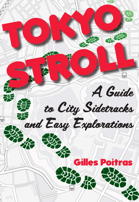
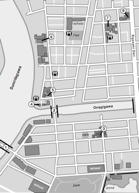

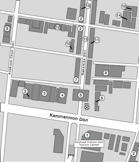

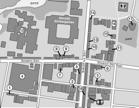






Tokyo Stroll Supplement: Fukagawa
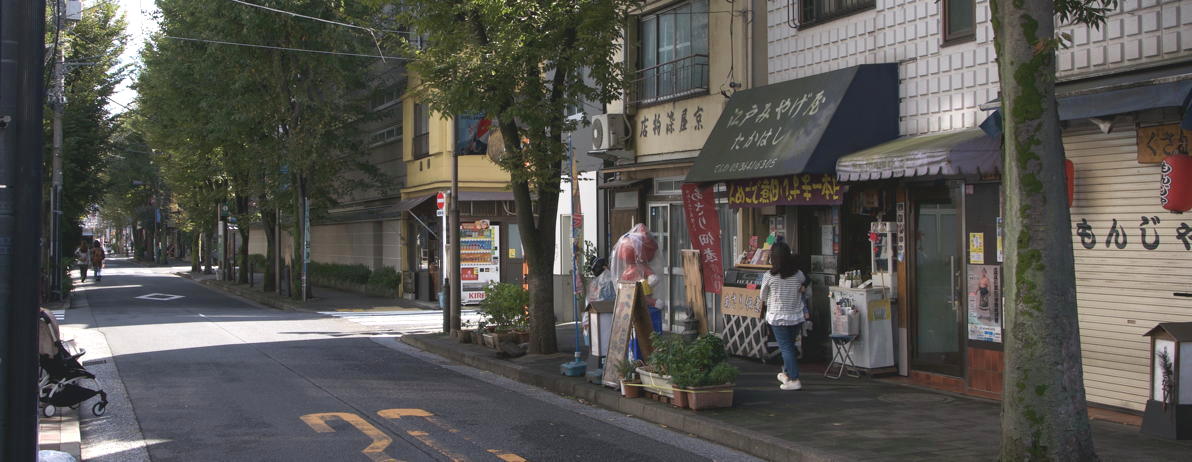
This page indexes, contains corrections and has additions to the Fukagawa chapter of Tokyo Stroll.
For information on Tokyo Stroll and this web supplement see Tokyo Stroll Supplement home page
For users of the Organic Maps, Maps.Me and Google Maps apps the items below have bookmarks you can import into those apps to make navigation easier.
Instructions and links are on the Viewing Locations in Organic Maps, Maps.Me, Google Maps, or Google Earth page.
Some entries on this page may include a note that says "Description to be added soon ." These entries are for items I felt should be listed even if the description is not ready to assist those who wish to plan a trip. When possible I included a link to an official web page, I suggest also doing web searchs for more information.
Bashō Heritage Garden / Bashōan Shiseki Tenbō Garden (芭蕉庵史跡展望庭園): Tokyo Stroll, Fukagawa Chapter, page 128
NEAREST TRAIN/SUBWAY STATION: Morishita Station (Toei Ōedo Line, Toei Shinjuku Line), Kiyosumi-shirakawa Station (Tokyo Metro Hanzōmon Line, Toei Ōedo Line)
Bashō Inari Shrine / Bashō Inari Jinja (芭蕉稲荷神社): Tokyo Stroll, Fukagawa Chapter, page 128
NEAREST TRAIN/SUBWAY STATION: Morishita Station (Toei Ōedo Line, Toei Shinjuku Line), Kiyosumi-shirakawa Station (Tokyo Metro Hanzōmon Line, Toei Ōedo Line)
Bashō Museum / Bashō Kinenkan (芭蕉記念館): Tokyo Stroll, Fukagawa Chapter, page 129
NEAREST TRAIN/SUBWAY STATION: Morishita Station (Toei Ōedo Line, Toei Shinjuku Line)
Cattlea (カトレア): Tokyo Stroll, Fukagawa Chapter, page 129
NEAREST TRAIN/SUBWAY STATION: Morishita Station (Toei Ōedo Line, Toei Shinjuku Line)
Eitaibashi (永代橋): Tokyo Stroll, Fukagawa Chapter, page 126
NEAREST TRAIN/SUBWAY STATION: Monzen-nakachō Station (Toei Ōedo Line, Tokyo Metro Tozai Line)
Eitaiji (永代寺): Tokyo Stroll, Fukagawa Chapter, page 120
NEAREST TRAIN/SUBWAY STATION: Monzen-nakachō Station (Toei Ōedo Line, Tokyo Metro Tozai Line)
Enjuin (円珠院): Tokyo Stroll, Fukagawa Chapter, page 121
NEAREST TRAIN/SUBWAY STATION: Kiyosumi-shirakawa Station (Tokyo Metro Hanzōmon Line, Toei Ōedo Line)
Former Fukagawa red light district / Fukagawa Okabasho Hanamachi Ato (深川岡場所・花街跡): Tokyo Stroll, Fukagawa Chapter, page 116
NEAREST TRAIN/SUBWAY STATION: Monzen-nakachō Station (Toei Ōedo Line, Tokyo Metro Tozai Line)
Fukagawa Edo Museum / Fukagawa Edo Shiryōkan (深川江戸資料館): Tokyo Stroll, Fukagawa Chapter, page 125
NEAREST TRAIN/SUBWAY STATION: Kiyosumi-shirakawa Station (Tokyo Metro Hanzōmon Line, Toei Ōedo Line)
WEB:
https://www.kcf.or.jp/fukagawa/
Fukagawa Fudō-son see: Naritasan Fukagawa Fudōdō (成田山 深川不動堂): Tokyo Stroll, Fukagawa Chapter, page 120
NEAREST TRAIN/SUBWAY STATION: Monzen-nakachō Station (Toei Ōedo Line, Tokyo Metro Tozai Line)
WEB:
https://fukagawafudou.gr.jp
Fukagawa Inari Shrine / Fukagawa Inari Jinja (深川稲荷神社): Tokyo Stroll, Fukagawa Chapter, page 128
NEAREST TRAIN/SUBWAY STATION: Kiyosumi-shirakawa Station (Tokyo Metro Hanzōmon Line, Toei Ōedo Line)
Fukagawa Shinmei Shrine / Fukagawa Shinmeigū (深川神明宮): Tokyo Stroll, Fukagawa Chapter, page 129
NEAREST TRAIN/SUBWAY STATION: Morishita Station (Toei Ōedo Line, Toei Shinjuku Line)
WEB:
https://www.fukagawa-shinmei.com
Fukagawajuku (深川宿): Tokyo Stroll, Fukagawa Chapter, page 124
Two locations.
NEAREST TRAIN/SUBWAY STATION: Kiyosumi-shirakawa Station (Tokyo Metro Hanzōmon Line, Toei Ōedo Line), Monzen-nakachō Station (Toei Ōedo Line, Tokyo Metro Tozai Line)
WEB:
https://www.fukagawajuku.com
Fuyuki Bentendō (冬木弁天堂): Tokyo Stroll, Fukagawa Chapter, page 121
NEAREST TRAIN/SUBWAY STATION: Monzen-nakachō Station (Toei Ōedo Line, Tokyo Metro Tozai Line)
Hachimanbashi (八幡橋): Tokyo Stroll, Fukagawa Chapter, page 119
NEAREST TRAIN/SUBWAY STATION: Monzen-nakachō Station (Toei Ōedo Line, Tokyo Metro Tozai Line)
Hōjōin (法乗院): Tokyo Stroll, Fukagawa Chapter, page 121
NEAREST TRAIN/SUBWAY STATION: Kiyosumi-shirakawa Station (Tokyo Metro Hanzōmon Line, Toei Ōedo Line)
Kiyosubashi (清洲橋): Tokyo Stroll, Fukagawa Chapter, page 126
NEAREST TRAIN/SUBWAY STATION: Kiyosumi-shirakawa Station (Tokyo Metro Hanzōmon Line, Toei Ōedo Line)
Kiyosumi Garden / Kiyosumi Teien (清澄庭園): Tokyo Stroll, Fukagawa Chapter, page 124
NEAREST TRAIN/SUBWAY STATION: Kiyosumi-shirakawa Station (Tokyo Metro Hanzōmon Line, Toei Ōedo Line)
WEB:
https://www.tokyo-park.or.jp/teien/en/kiyosumi/index.html
Mannenbashi (萬年橋): Tokyo Stroll, Fukagawa Chapter, page 128
NEAREST TRAIN/SUBWAY STATION: Morishita Station (Toei Ōedo Line, Toei Shinjuku Line), Kiyosumi-shirakawa Station (Tokyo Metro Hanzōmon Line, Toei Ōedo Line)
Mantokuin (萬徳院)
A Shingon Buddhist temple founded in 1626 and originally in Hatchōbori on the other side of the Sumidagawa the temple was relocated to this spot in 1643. This temple is known for having many graves of sumo wrestlers and referees, a connection that resulted in the temple being often referred to as Sumodera, "Sumo Temple." The entrance on the south.
NEAREST TRAIN/SUBWAY STATION: Monzen-nakachō Station (Toei Ōedo Line, Tokyo Metro Tozai Line)
Naritasan Fukagawa Fudōdō (成田山 深川不動堂): Tokyo Stroll, Fukagawa Chapter, page 120
NEAREST TRAIN/SUBWAY STATION: Monzen-nakachō Station (Toei Ōedo Line, Tokyo Metro Tozai Line)
WEB:
https://fukagawafudou.gr.jp
Reiganji (霊巌寺): Tokyo Stroll, Fukagawa Chapter, page 126
NEAREST TRAIN/SUBWAY STATION: Kiyosumi-shirakawa Station (Tokyo Metro Hanzōmon Line, Toei Ōedo Line)
Ryūkōin (龍光院)
I am including this tiny temple as it the one for Bishamon on the Fukagawa Shichifukujin pilgrimage tour. The neighborhood is a residential one, the temple is on a corner with a signal light. The entrance is on the east side, there is a driveway on the north side.
NEAREST TRAIN/SUBWAY STATION: Kiyosumi-shirakawa Station (Tokyo Metro Hanzōmon Line, Toei Ōedo Line)
Shin-Ōhashi (新大橋): Tokyo Stroll, Fukagawa Chapter, page 128
NEAREST TRAIN/SUBWAY STATION: Morishita Station (Toei Ōedo Line, Toei Shinjuku Line)
Shingyōji (心行寺): Tokyo Stroll, Fukagawa Chapter, page 121
NEAREST TRAIN/SUBWAY STATION: Monzen-nakachō Station (Toei Ōedo Line, Tokyo Metro Tozai Line)
Tagawa Suihō Norakuro Museum (田河水泡・のらくろ館)
Norakuro was a famous and highly influential manga by Tagawa Suihō, which began in 1931 and ran for ten years. Norakuro is about a black and white dog who joined the Army. The basic story is that he is a member of a troop of dogs fighting against the Monkey Army. The author, who grew up in Fukagawa, drew upon his experiences as a veteran in writing his tales. The U.S. cartoon character Felix the Cat was a great influence on the design, Tagawa was a fan of the Pat Sullivan films. The manga was animated in the 1930s and later in the 1970s and 80s.
NEAREST TRAIN/SUBWAY STATION: Morishita Station (Toei Ōedo Line, Toei Shinjuku Line), Kiyosumi-shirakawa Station (Tokyo Metro Hanzōmon Line, Toei Ōedo Line)
WEB: https://www.kcf.or.jp/morishita/josetsu/norakuro/pamphlet_en.pdf
Tomioka Hachimangū (富岡八幡宮): Tokyo Stroll, Fukagawa Chapter, page 119
NEAREST TRAIN/SUBWAY STATION: Monzen-nakachō Station (Toei Ōedo Line, Tokyo Metro Tozai Line)
WEB:
http://www.tomiokahachimangu.or.jp
Back to the Tokyo Stroll Supplement home page - Privacy Notice - Back to Gilles' home page
Created July 10, 2919 | Content last updated September 22, 2025